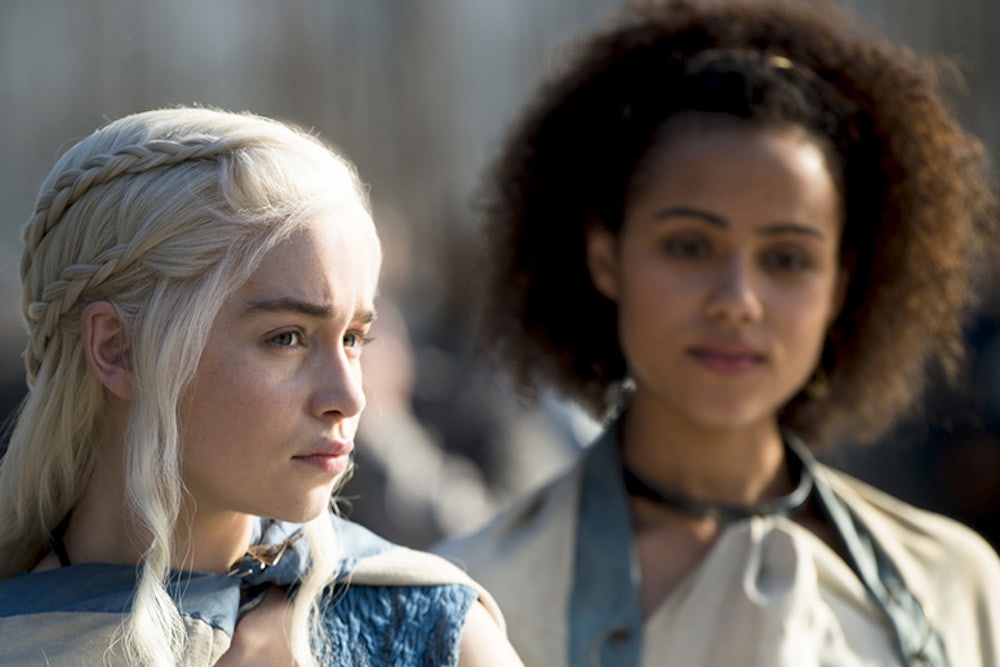A roundtable on the fourth season of "Game of Thrones," which aired its finale on Sunday night.
Esther Breger: Sometime I think all the people watching “Game of Thrones” aren’t watching the same show, or just wish they weren’t. My dream “Game of Thrones” would cut all the scenes about Jon Snow, Bran, Reek, and Stannis. There would be fewer technically impressive action sequences like last week’s episode, and more scenes of Cersei drinking wine and Arya bickering with the Hound. I have no doubt that George R.R. Martin has a grand plan to bring all these sprawling strands together, but as a non-book reader, it’s often hard to sense any momentum besides the constant stream of death. In fact, of all the shock and awe this season, the development I’m most invested in may be Grey Worm and Missandei’s budding relationship—which didn’t even exist in the books, from what I understand. But before I turn this over to the book-readers among us, I have to bring up Cersei’s rape, which I know has already been dissected endlessly. But with the season coming to an end, I can’t stop thinking: What was the point? It hasn’t been used to understand Cersei’s inner life; Cersei hasn’t even had an inner life in recent episodes, only appearing to disdainfully glare at Tyrion. It’s just been disheartening to see this complicated character turn into the Wicked Witch, while Jamie gets to be the heroic knight and loyal brother.
Danny Vinik: Fellow non-book reader here. I can't make any sense of Cersei's rape. I haven't heard any logical explanation for it and as Esther says, it hasn't added anything to Cersei's character. Maybe it will somehow make sense in the seasons to come, but it's hard to see how. As for momentum in the show, I agree and disagree. There are a few different storylines that are building toward their end points, but it's unclear how they will be integrated together. For instance, the battle in episode 9 between Mance Rayder's wildling army and the men of the Night's Watch had been building for an entire season. Same with Tyrion's trial. How those fit together is unclear, but that's part of what I enjoy about the show. By building different storylines, George R.R. Martin and the directors create multiple climaxes—and that allows for multiple shock events, which is my favorite part of the show.
Amanda Silverman: Full disclosure: You're getting another non-book reader here.
Esther: Sorry Amanda, but I have to admit I always hated Robb Stark. He was the embodiment of every fantasy-genre cliche that “Game of Thrones” tries to subvert: the handsome, noble scion who should by all rights be the hero of this story. But “Game of Thrones” has no heroes, and anybody who looks like one is probably lying, ineffectual, or about to die. Without a center, the show forces us to constantly refocus our empathy and point of view; that’s the radical effect of the sprawling storytelling style that I sometimes find so frustrating and momentum-killing. Tyrion, the closest thing this show has to a lead, has spent most of this season confined to a prison cell. (Not that this stops Peter Dinklage from being the most entertaining character in any given episode.) Jaimie’s redemption journey is interrupted by raping his sister. Oberyn Martell briefly seemed like he could fill the hero’s role: he had the right kind of rakish charisma, a mission, and a mortal enemy. Last week Jon Snow saved Castle Black, but his dour courage was overshadowed by Sam, who gets his leading-man moment and even gets the girl. Sunday night’s episode is titled “The Children,” and whoever that ends up referring to—an interesting story for Bran, finally?—it seems like a fitting ending for a season advertised with the slogan “All men must die.”
